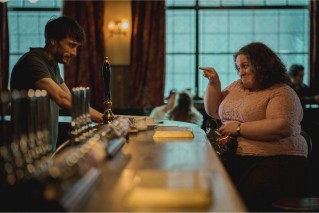Priscilla exposes disturbing side of famous marriage

Source: YouTube/Madman Films
Sofia Coppola’s latest film shows how Elvis Presley’s courtship of the very young Priscilla locked her in a gilded cage that had little to do with love and a lot to do with his immature notion of what marriage should be.
The undercurrents in this toxic fairytale about the woman Elvis married are unexpectedly disturbing when looked at next to the rapturous global coverage of their wedding 50 years ago.
Perhaps that should come as no surprise. Sofia Coppola is an intriguing female director who 20 years ago exploded onto the scene with Lost in Translation, a film about the strange friendship between a young woman and an older man stranded in a Tokyo hotel. It was different, clever and a masterwork of eccentric attraction that tapped into the weirdness of Japanese nightlife.
It was always going to be interesting to see what the director could do with the story of another captive when the real Priscilla, 78, was standing by as executive producer, safeguarding her version of events.
The result is more stifled than most Coppola films but features typically great music (The Ramones, Brenda Lee), touching cultural insights, and the unknown yet impressive Cailee Spaeny as the frighteningly young Priscilla. Towering over her is Queensland heartthrob Jacob Elordi in what is more of a sketch of Elvis that Austin Butler’s obsessive reincarnation in Baz Luhrmann’s 2022 film, Elvis.
At a German army base in 1959, 14-year-old Priscilla Beaulieu goes to a party and meets her idol. He is oddly taken with her and the upshot is that three years later he persuades her parents to let her come to Los Angeles and then stay at Graceland in Memphis. All this while she is still going to school.
It is all terribly chaste – this is Priscilla’s version, so let’s stick with that – but even so, it was horribly off. Her parents were initially reluctant but succumbed to the siren call of celebrity and the promise of first-class plane tickets. If this was Michael Jackson and Priscilla was a boy, it is unclear how things would have been different.
What emerges so powerfully under Coppola’s direction is that Elvis’s fixation with Priscilla arose from an utterly juvenile notion of what love between a man and woman should be. He was the unsophisticated product of the American south in the 1940s and 1950s, when housebound wives were at their husband’s beck and call. Never mind that he preferred real women with something to offer, like Ann-Margret and Nancy Sinatra, whom he was seducing in Hollywood.
Priscilla waited, pathetically befriending the Graceland staff for company, then waving off Elvis and his entourage after another visit.
His incredible fame put him at the centre of a universe in which he was surrounded by sycophants who were slaves to his pleasure. He was answerable to no one. Priscilla wore the fussy, overly feminine clothes and heavy eye make-up that he chose, and her later preference for trousers and blouses, her hair flattened to near normal, was a marker of emancipation.
Priscilla’s story, which Coppola wrote from the memoir Elvis and Me and re-tells here, ends when she leaves Graceland with young Lisa Marie and, we assume, becomes her own woman.
But Elvis casts a long shadow and six decades later the real Priscilla is still defined by a relationship that, although she may not see it, bypassed anything like true love. Maybe this subversive truth is what Coppola wanted us to know.
Priscilla is in cinemas now.
This article is republished from InReview under a Creative Commons licence. Read the original article.
InReview is an open access, non-profit arts and culture journalism project. Readers can support our work with a donation. Subscribe to InReview’s free weekly newsletter here.
![]()








